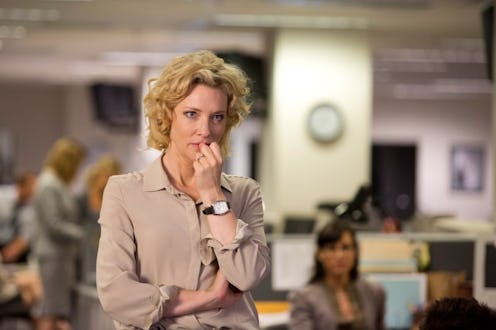Entertainment
Why 'Truth's Cate Blanchett Isn't An Anti-Heroine

In the movie Truth, writer/director James Vanderbilt tackles the real-life story of journalist Mary Mapes (Cate Blanchett), and her 2004 60 Minutes story that investigated George W. Bush's past military service. Based on Mapes' memoir, Truth and Duty: The Press, the President and the Privilege of Power, the movie puts the spotlight on how she, Dan Rather (Robert Redford), and their team were heavily criticized for their flawed report (the documents they cited may have been forged) on Bush allegedly receiving special treatment in the '70s to avoid being sent to Vietnam. The report caused a firestorm of controversy, and ultimately, it led to the firing of Mapes and Rather from CBS. And so when Vanderbilt wanted to tell this story in Truth , he knew he couldn't sugar-coat the events — or his characters, like Maples.
"It wasn't about making her look more heroic or less heroic or an anti-hero. It was really just about showing this woman in a three-dimensional way," Vanderbilt tells Bustle, adding that he wanted to show "all sides of Mary, warts and all... we all have flaws and we all have strengths and being able to show Mary's strengths and flaws in the character, I think, were what hopefully makes this a really good drama."
Considering how male-centric the world Mapes worked in was (and still largely is), it's interesting to wonder if her situation and its outcome would've been different if she were a man. Posed the question, Vanderbilt says there's no way to know one way or another, but at the same time, it's hard to ignore the reality of journalism's gender disparity.
"I think that she probably had to work harder to get to where she would if she was a man," Vanderbilt says. "I don't think that's a controversial statement although we'll see, I guess."
The director points out one scene in particular that may have been different if Mapes was male: when she goes online and sees attacks from the public.
"There's a scene, which is absolutely true, where she Googles herself — which now we know is a terrible idea," Vanderbilt says. "All the comments that she sees say pretty terrible things — and all of them are real comments written about [her]. They attack her looks and sexuality. They attack her in a very specific way that probably is not going to be the same way a man got attacked."
Vanderbilt says it was important to show everything that happened to Mapes as a result of the report, good or bad, and he collaborated with Blanchett to give the character her realistic complexity.
"I don't want to put words in Cate's mouth but when we talked about it, [we discussed that] one of the things that is exciting about the character is that you get to see her in her highest highs and her lowest lows," Vanderbilt says. "When you meet her, she is at the top of her profession. She has her dream job. She's working at CBS News with Dan Rather. She's got a great husband, she's got a great kid. She's just broken the Abu Ghraib prison story which was one of the stories of the decade."
Yet due to that one, controversial story, Mapes' career and personal life began to unravel. The director says that viewers will see "pieces of armor stripped away" in the film, and see the reporter as vulnerable and human.
Yet until Mapes gave Vanderbilt her blessing, the journalist's depiction — and the movie itself — might not have even happened. Vanderbilt recalls the difficult process that was convincing Mapes to sign over the rights to her book.
"She was still in sort of in this defensive crouch from everything that happened," says the director. "I said [to her], 'Listen, I completely understand that you're not necessarily excited about doing something in terms of a movie like this, but I'd love to just come down to Dallas and talk to you a little bit and meet you face to face and tell you why I think this could be really great.'"
So Mapes invited Vanderbilt and his wife down to Dallas, and after spending some quality "get-to-know-you" time together, the reporter gave the director permission to use the book. Still, he doesn't take full credit for convincing her to make that decision.
"My wife is much more interesting and funny than I am," says Vanderbilt. "She was sort of the closer."
Whatever the reason, audiences everywhere are thankful that Mapes agreed to let Vanderbilt make Truth, in theaters Oct. 16, and put her fascinating, controversial story on the big-screen.
Images: Sony Pictures Classics (2)